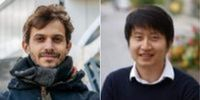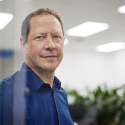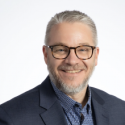This year's pitch competition took place on October 27th, 2022 during the John D. Thompson Entrepreneurial Development Seminar and it had a Cleantech theme.
During the event, 5 Cleantech Idea finalists pitched their idea to a panel of judges from the business and technical community. The top 3 pitches won cash prizes of $500, $250 and $100. The audience also got a chance to select their favorite pitch and the winning team received $50!
The competition encourages McGill students, working in teams, to propose new technologically-based ideas/solutions in the form of new products, services and/or ventures to solve real world problems.
Winning Teams
 1st Place
1st Place
Ikei
Gabriele Capilli (Mining and Materials Engineering, Postdoctoral Fellow) and Minh Tran (Electrical and Computer Engineering, PhD candidate)
Ikei aims to provide a low-cost, high-precision nutrient monitoring system for more efficient use of water and nutrients in hydroponic agriculture, and reduction of waste-water release. Typically, after multiple growth cycles, the nutrients in a hydroponic system become imbalanced, forcing growers to flush their system to prepare a new water culture. By monitoring the system’s nutrient content, nutrient water can be recycled through rebalancing, reducing costs and reducing waste.
 2nd Place
2nd Place
Quantus
Kirk H. Bevan (Department of Mining and Materials Engineering), Yee Wei Foong (Department of Mining and Materials Engineering, PhD candidate) and Prof. Philippe Ouzilleau (Department of Mining and Materials Engineering, Postdoctoral Fellow)
The research project is to design an energy storage device via new mechanism that can store as much energy as batteries but charge 2-10 times faster. Supercapacitors store more energy than double layer capacitors through redox reactions. Ideally, these redox reactions should allow multiple Faradaic electron transfers that overlap to form a near rectangular voltammetry profile to mimic double layer capacitance – hence the name “pseudocapacitance”.
 3rd Place & Audience Favourite
3rd Place & Audience Favourite
GreenTrack
Benjamin Pérez (Bioengineering, undergrad), Cleo Chuying Cao (Bioengineering, undergrad) and Michael Asseraf (Bioengineering, undergrad)
Quantifying the environmental effects of a company is extremely hard and remains largely an untapped opportunity. Our idea is a non-profit data platform that tracks the environmental impact of products throughout their value chain. The algorithm will track several metrics such as water consumption, carbon emission, land use, plastic usage, electricity, use of non-renewable resources, etc. to output a specific sustainability score range.
Remaining Cleantech Idea Finalists
 Bio-HydroReactor
Bio-HydroReactor
Andres Gonzalez Reina (Bioengineering, undergrad) and Toufic Jrab (Bioengineering, undergrad)
Proposed solution: Mimicking and improving on the current prototype of a double-chamber microbial electrolysis cell system of biohydrogen production. Specifically, this idea of microbial electrolysis cell system will be incorporated into the proposed design project of a bioreactor; the bioreactor takes farm waste as an input toward dark fermentation, a process that yields acetic acid and few molecular hydrogen gas which will be transported to be stored in a compressed gas chamber.
 Maneico
Maneico
Charlotte Volk (Bioengineering, undergrad) and Emma Wong (Bioengineering, undergrad)
Natural, eco-friendly mosquito repellent using mangrove leaf extract that targets disease-carrying mosquitoes in Ghana. Red mangrove extract is repellent and larvicidal against the main disease-carrying mosquitoes present in Ghana, including those that carry yellow fever, malaria, and filarial disease. Research has shown that red mangrove leaf extract is as effective as DEET against mosquitoes and sandflies while being nontoxic and derived from natural ingredients.
Cleantech Idea Judges
 Chris Stern, CEO and Co Founder at CarbiCrete
Chris Stern, CEO and Co Founder at CarbiCrete
Chris Stern is the CEO and Co-Founder of CarbiCrete, a Montreal-based carbon removal technology company that has created a cement-free, carbon negative process for making pre-cast concrete using industrial waste by-products from the steel-making industry. The patented technology stems from McGill Civil Engineering Professor Yixin Shao and his post-doc researcher at the time Dr. Mehrdad Mahoutian, CTO and co-founder of CarbiCrete.
The R&D team received early-stage funding via the William and Rhea Seath Award in Engineering Innovation from the McGill Engine Centre. In addition to CarbiCrete, Chris serves as an Advisor and Director to several Cleantech companies in the US and Canada, including EnergyPal, a North American residential solar provider.
 Dr. Theodora Alexakis, Vice President of Business Development at Terragon Environmental Technologies
Dr. Theodora Alexakis, Vice President of Business Development at Terragon Environmental Technologies
Theodora is a Chemical Engineer who has led the development and commercialization of a number of waste treatment technologies for over 25 years. She has worked with Terragon for 16 years, initially leading the development of MAGS, a waste to energy appliance and, more recently leading the commercialization of all of Terragon’s technologies in various markets. Theodora has multiple degrees from McGill University including a B.Eng, M.Eng and PhD in Chemical Engineering.
 Dr. Sylvain Coulombe, registered Engineering Physicist and Professor of Chemical Engineering at McGill University
Dr. Sylvain Coulombe, registered Engineering Physicist and Professor of Chemical Engineering at McGill University
From 1997 to 2001 he was a Senior Research Scientist with GE Research (USA). From 2018 to 2021 he was Associate Vice-Principal, Innovation and Partnerships with McGill University. He is an expert in plasma source and process development with applications in nanomaterial and nanostructure synthesis, electrical power-to-X, circular fuels and materials, and powder re-processing. He has co-authored more than 300 peer-reviewed publications and conference contributions. He is Director of the McGill Centre for Innovation in Storage and Conversion of Energy. He teaches courses in plasma engineering, resource recovery and circular use, transport phenomena, and process instrumentation and control.
